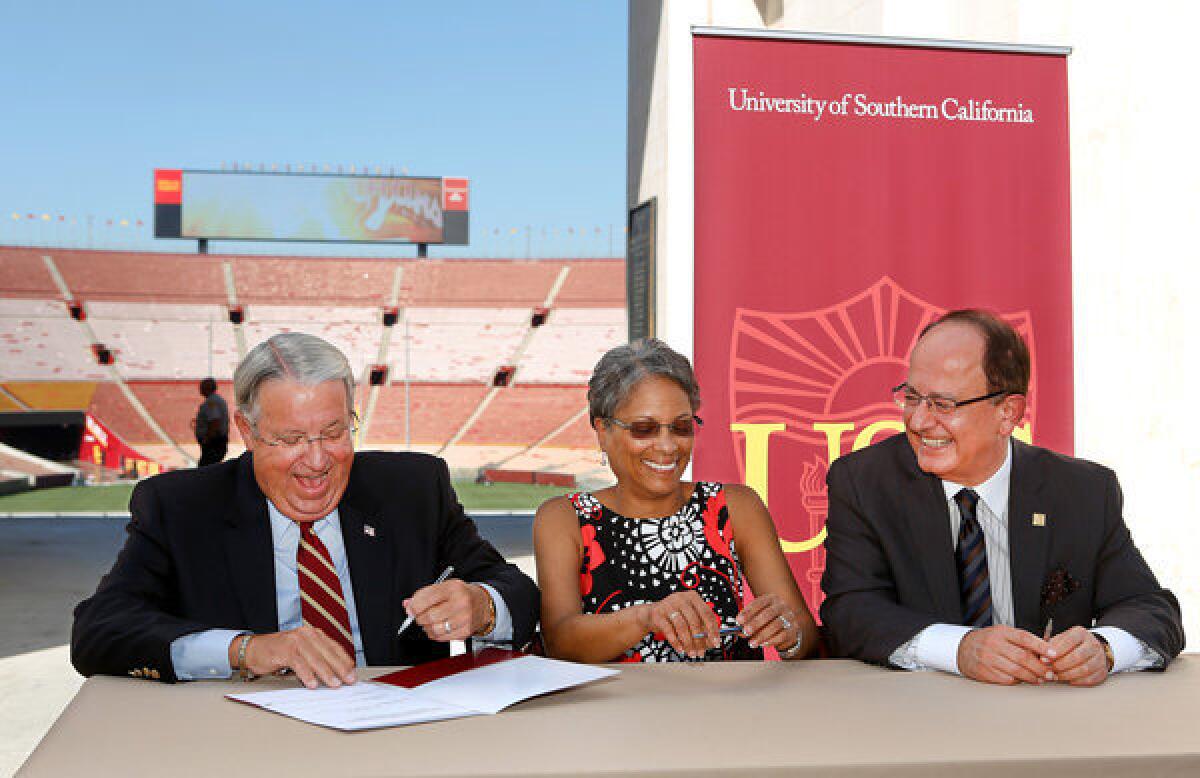Judge refuses demand for The Times to surrender emails

The Los Angeles Memorial Coliseum Commission unsuccessfully sought an emergency court order Friday demanding The Times and others surrender internal emails about its behind-the-scenes efforts to give USC control of the stadium.
In the emails, commission officials discuss such topics as limiting public debate of a proposed USC lease of the taxpayer-owned Coliseum and excluding state officials from closed-door talks on the deal. The documents also show the panel’s then-president and its top administrator tallying the commission’s expected vote on the lease terms weeks before they were made public.
The 94 pages of emails were mailed anonymously last month to two Times reporters and 24 other people, including Gov. Jerry Brown and Los Angeles Mayor Eric Garcetti.
DOCUMENT: Read the Coliseum e-mails
The commission asked Los Angeles County Superior Court Judge Luis A. Lavin to order The Times and the other recipients to hand over their copies of the documents on the grounds that they contained privileged communications between the agency and its lawyers.
In addition, the commission asked Lavin to disqualify attorneys for The Times and a nonprofit 1st Amendment group, Californians Aware, from litigating an open-government lawsuit they have filed against the stadium authority. The commission’s lawyer, Deborah Fox, alleged that the attorneys saw the privileged emails and thus were “tainted” under court rules.
Lavin, however, said the commission presented “no evidence whatsoever” that the emails contained material that was protected under the attorney-client privilege. Lavin said he had not been given a complete set of documents.
Lavin rejected as “grossly overbroad” the commission’s demand for the emails. “You’re asking me to have parties, including the governor of California, return documents sent to him?” Lavin asked.
The judge also said he had no way of knowing who leaked the emails. It could have been an official who waived attorney-client privilege by distributing them to third parties, he said. The commission is made up of three county supervisors and three representatives each for the city and the state.
The email packages included a cover letter addressed to The Times alleging that the correspondence was evidence the commission “blatantly violated” the state’s open-meetings law during the USC deliberations. The Ralph M. Brown Act ensures the public’s right to observe deliberations and votes of legislative bodies.
“In addition, there appears to be multiple instances of would-be vote counting,” the letter said. State law generally bars officials of legislative bodies from taking action in secret, such as counting votes, that should be done publicly.
In one email, dated Nov. 27, 2011, the commission’s then-president, David Israel, told the Coliseum’s interim general manager, John Sandbrook, he did not want state officials to participate in broader discussions of the USC lease.
“I am determinedly opposed to a three-way meeting, including the state in the Coliseum negotiations with USC,” Israel wrote. “Once they are in the room, they will feel free to offer thoughts and suggestions on all aspects of the matter, not just those specified on whatever agenda is distributed. That will complicate this unnecessarily.”
In another email, on Dec. 14, 2011, a commission lawyer said the panel could not publicly deliberate on the lease during an upcoming meeting because its negotiation team entered into a confidentiality agreement with USC.
“If the negotiators have agreed to keep the … negotiations confidential, you cannot have an open session discussion, without USC waiving the confidentiality,” wrote Assistant County Counsel Thomas Faughnan.
In a third email, Israel and Sandbrook strategized about which commissioners may oppose controversial parts of the lease, such as giving USC control of the Sports Arena along with the Coliseum.
On Dec. 8, 2011, Israel wrote: “[William] Chadwick became an obstacle, though mostly one fueled by massive ego, and [Barry] Sanders once again wants the Sports Arena considered separately … That said, we will have the votes at nut crunching time.”
Sandbrook replied: “You are correct on the vote counting.”
In an exchange dated Dec. 16, 2011, Israel wrote: “I only need six to do the deal, and we have seven” —and cites, in addition to himself, three county supervisors, commissioner Johnathan Williams, City Councilman Tom LaBonge and alternate Fabian Wesson.
DOCUMENT: Read the Coliseum emails
Israel and Sandbrook declined interview requests; Sanders and Chadwick did not respond.
Los Angeles City Councilman Bernard C. Parks, a former commissioner, said he believed the emails show the panel violated the Brown Act.
“It clearly establishes there was an agenda to get this resolved regardless of board members’ input,” Parks said. “The whole purpose of the Brown Act is to have those discussions openly.”
ALSO:
Coliseum deal: USC to cash in on turnover
California Science Center grants control of Coliseum to USC
Coliseum sued over alleged violations of open-government laws
Twitter: @jillcowan | @ronlin | @PringleLATimes
More to Read
Sign up for Essential California
The most important California stories and recommendations in your inbox every morning.
You may occasionally receive promotional content from the Los Angeles Times.












